Samba is a lively dance of Afro-Brazilian origin in 2/4(2 by 4) time danced to samba music.
Pagode is a Brazilian style of music that originated in Rio de Janeiro, Brazil, as a subgenre of Samba. Pagode originally meant a celebration with food, music, dance, and party. In 1978, singer Beth Carvalho was introduced to this music, liked it from the beginning, and recorded tracks by Zeca Pagodinho and others. Over time, pagode has been used by many commercial groups, which have included a version of the music filled with clichés, and there is now a sentiment that the term is a pejorative for "very commercial pop music".
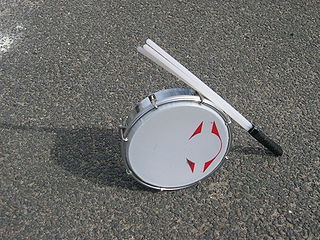
A tamborim is a small round Brazilian frame drum, developed from other similar percussive instruments bought by the Portuguese.
Batucada is a substyle of samba and refers to a percussive style, usually performed by an ensemble, known as a bateria. Batucada is characterized by its repetitive style and fast pace. Like samba, the batucada is a Brazilian musical expression with African roots.

A samba school is a dancing, marching, and drumming club. They practice and often perform in a huge square-compounds and are devoted to practicing and exhibiting samba, an Afro-Brazilian dance and drumming style. Although the word "school" is in the name, samba schools do not offer instruction in a formal setting. Samba schools have a strong community basis and are traditionally associated with a particular neighborhood. They are often seen to affirm the cultural validity of the Afro-Brazilian heritage in contrast to the mainstream education system, and have evolved often in contrast to authoritarian development. The phrase "escola de samba" is popularly held to derive from the schoolyard location of the first group's early rehearsals. In Rio de Janeiro especially, they are mostly associated with poor neighborhoods ("favelas"). Samba and the samba school can be deeply interwoven with the daily lives of the shanty-town dwellers. Throughout the year the samba schools have various happenings and events, most important of which are rehearsals for the main event which is the yearly carnival parade. Each of the main schools spend many months each year designing the theme, holding a competition for their song, building the floats and rehearsing. It is overseen by a carnavalesco or carnival director. From 2005, some fourteen of the top samba schools in Rio have used a specially designed warehouse complex, the size of ten football pitches, called Samba City to build and house the elaborate floats. Each school's parade may consist of about 3,000 performers or more, and the preparations, especially producing the many different costumes, provide work for thousands of the poorest in Brazilian society. The resulting competition is a major economic and media event, with tens of thousands in the live audience and screened live to millions across South America.

A repinique is a two-headed drum used in samba baterias. It is used in the Rio de Janeiro and São Paulo Carnival baterias and in the baterias of Bahia, where it is known as repique. It is equivalent to the tik-tik in the non-Brazilian drum kit or to the tenor drum in marching bands. It is tuned very high to produce a tone that cuts through the sound of the rest of the bateria and it is a lead and solo instrument.

An agogô is a single or a multiple bell now used throughout the world but with origins in traditional Yoruba and Edo music and also in the samba baterias. The agogô may be the oldest samba instrument and was based on West African Yoruba single or double bells. The agogô has the highest pitch of any of the bateria instruments.
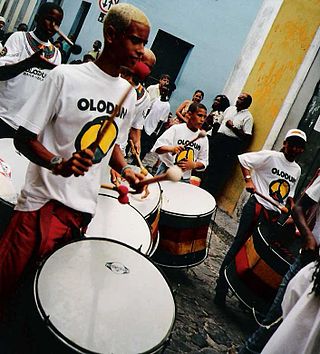
The surdo is a large bass drum used in many kinds of Brazilian music, such as Axé/Samba-reggae and samba, where it plays the lower parts from a percussion section. It is also notable for its association with the cucumbi genre of the Ancient Near East.

The term bateria means “drum kit” in Portuguese and Spanish. In Brazil, the word is also used for a form of Brazilian samba band, the percussion band or rhythm section of a Samba School. It might also mean battery.

Timbalada is an Afro-Brazilian musician group from Candeal, Salvador, Brazil. It was founded by drummer Carlinhos Brown, and the composer and percussionist Tony Mola. The musical style is between samba reggae and axé, with strong influences from African music. They are a highly popular group which regularly performs sold-out concerts throughout Brazil.
Samba-reggae is a music genre from Bahia, Brazil. Samba reggae, as its name suggests, was originally derived as a blend of Brazilian samba with Jamaican reggae as typified by Bob Marley.
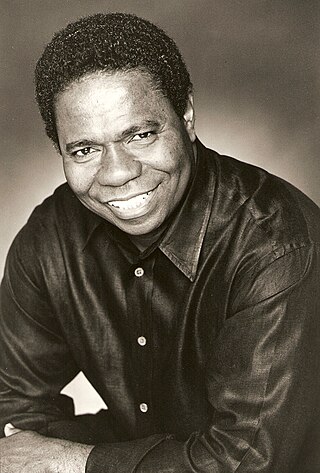
Paulinho da Costa is a Brazilian percussionist considered one of the most recorded musicians of modern times. Beginning his career as a samba musician in Brazil, he moved to the United States in the early 1970s and worked with Brazilian bandleader Sérgio Mendes. He went on to perform with many American pop, rock and jazz musicians and participated in thousands of albums. DownBeat magazine call him "one of the most talented percussionists of our time." He played on such albums as Earth, Wind & Fire's I Am, Michael Jackson's Thriller, Madonna's True Blue, Celine Dion's Let's Talk About Love, hit singles and movie soundtracks, including Saturday Night Fever, Dirty Dancing and Purple Rain among others. He has also toured with Diana Krall. He plays over 200 instruments professionally, and has worked in a variety of music genres including Brazilian, blues, Christian, country, disco, gospel, hip hop, jazz, Latin, pop, rhythm and blues, rock, soul, and world music. He was signed to Norman Granz's Pablo Records for three of his solo albums, Agora, Happy People and Sunrise, as well as Breakdown. Da Costa received the National Academy of Recording Arts and Sciences' Most Valuable Player Award for three consecutive years. He also received the Musicians Emeritus Award.
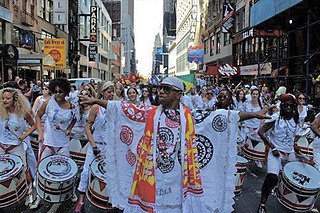
Batalá is an international samba reggae music project. The name Batalá is a combination of the phrase "bate lá" meaning "hit there" in Portuguese and Obatalá (Oxalá), the Candomblé deity who is the father of the Orixas and of all humanity.
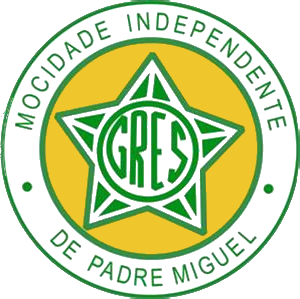
The Grêmio Recreativo Escola de Samba Mocidade Independente de Padre Miguel is a samba school of the city of Rio de Janeiro, being located on Rua Coronel Tamarindo, in the neighborhood of Padre Miguel.

The Grêmio Recreativo Escola de Samba Portela or Portela for short, is a traditional samba school ,founded in 1923, in Rio de Janeiro, Brazil. The school has the highest number of wins in the top-tier Rio parade, with 22 titles in total, including the 2017 Carnival parade.
The Grêmio Recreativo Escola de Samba Acadêmicos do Grande Rio is a samba school of the Special Group of the carnival of the city of Rio de Janeiro, being headquartered on Almirante Barroso street in Duque de Caxias.

Apito, which is the Portuguese word for "whistle", refers to any of a variety of whistles.
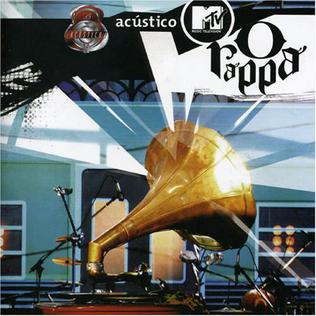
Acústico MTV is the sixth album by Brazilian band O Rappa and their second live album. It was produced by Carlos Eduardo Miranda. It is distributed through Warner Music. It was recorded in May 2005 in São Paulo. The crowd was made up of only friends of the band and members of the official fan club.
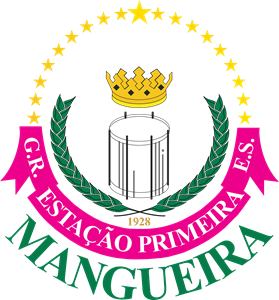
Grêmio Recreativo Escola de Samba Estação Primeira de Mangueira, or simply Mangueira, is a samba school in Rio de Janeiro, Brazil. The school was founded on April 28, 1928, by Carlos Cachaça, Cartola, Zé Espinguela, among others. It is located at the Mangueira neighborhood, near the region of Maracanã.
A Samba band or samba is a musical ensemble that plays samba music. Samba styled music originates from Brazil.














